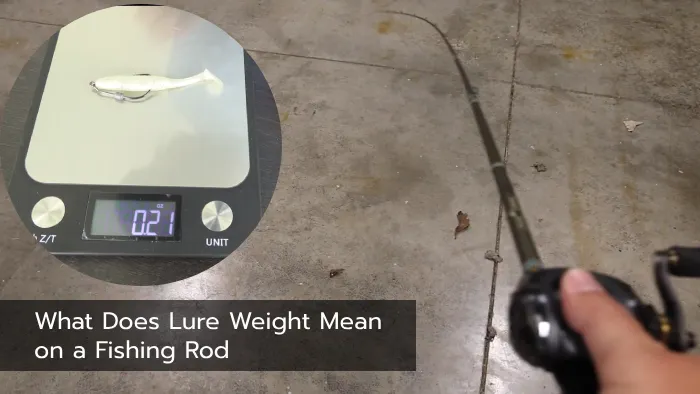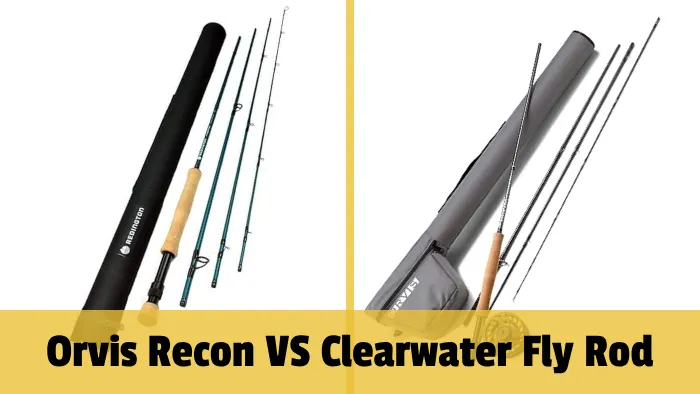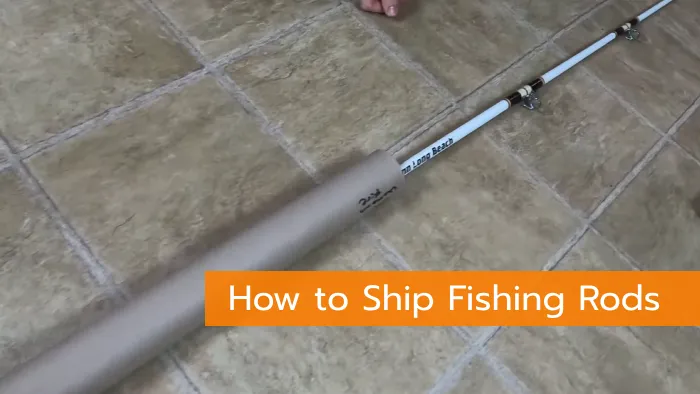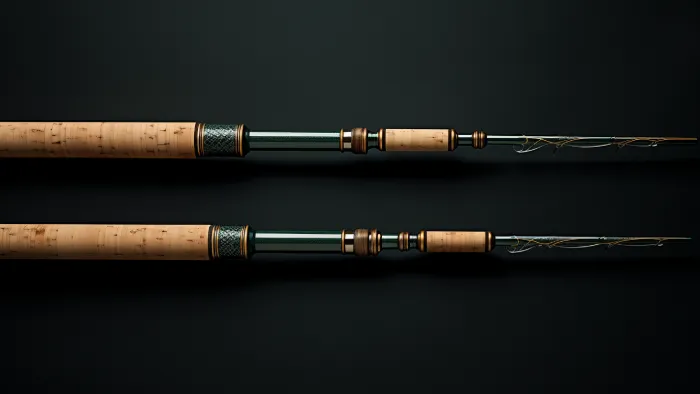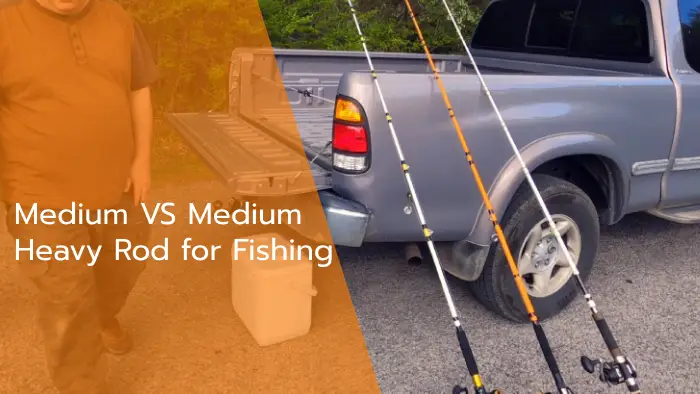Can You Use a Saltwater Rod in Freshwater: 4 Reasons You Can
Saltwater rod is built to endure the relentless forces of the open sea, designed to battle the mightiest of ocean monsters. But when the call of freshwater fishing beckons, you may wonder: Can you use a saltwater rod in freshwater? You can definitely use a saltwater rod in freshwater without any problems.
Saltwater rods are renowned for their resilience. They are crafted with materials that resist the corrosive effects of salt and built to withstand the intense struggles of battling formidable marine species.
The only thing to consider is that saltwater rods are typically heavier and sturdier compared to rods specifically designed for freshwater fishing.
We will discuss why saltwater rods can be used in freshwater, what to consider when using saltwater rods in freshwater, and the differences between saltwater and freshwater rods.
Reasons You Can Use a Saltwater Rod in Freshwater

You can use saltwater rods in freshwater for a variety of reasons. The following are among them:
- Versatility
- Corrosion resistance
- Strength and power
- Choice of reel
Now, take a look at the reasons in detail to gain a better understanding of why this is possible.
1. Versatility
You can easily use a saltwater rod in freshwater without worrying about damaging it. One of the main reasons for this is the versatility of saltwater rods.
These rods are designed to handle the tough conditions of saltwater fishing, such as strong currents and aggressive fish.
As a result, they are built to be sturdy and durable. This makes them perfectly capable of handling the relatively milder conditions of freshwater fishing.
Whether you’re casting for bass or trout in a freshwater lake or river in Michigan or other locations, a saltwater rod can easily handle the job.
So, if you already have a saltwater rod and want to try your hand at freshwater fishing, there’s no need to invest in a separate rod. Your saltwater rod will work just fine.
2. Corrosion Resistance
Saltwater rods are specifically designed to withstand the corrosive nature of saltwater, which can quickly deteriorate regular fishing rods.
These rods are constructed with materials that have high corrosion resistance, such as stainless steel or specially coated metals.
This corrosion resistance allows saltwater rods to be used in freshwater conditions without any degradation in performance.
Whether you’re casting your line in a freshwater lake or a saltwater bay, your saltwater rod will maintain its durability and functionality.
3. Strength and Power
If properly maintained, saltwater rods can provide the strength and power needed to handle larger fish species. They are designed for saltwater fishing but are also well-suited for freshwater fishing.
The strength and power of a saltwater rod can come in handy when targeting bigger fish in freshwater lakes or rivers.
The sturdy construction and heavier weight of saltwater rods allow for more control and leverage during the fight, making it easier to handle and land larger fish.
Additionally, these rods’ durability and corrosion resistance make them a reliable choice for freshwater fishing.
4. Choice of Reel
Another reason you can use a saltwater rod in freshwater is the flexibility in choosing the reel. The use of a saltwater rod offers a wide range of options in reel selection.
With a variety of reels to choose from, you can select the best reel that matches the specific requirements of freshwater fishing.
Different types of reels are designed to work in different freshwater environments.
For example, if you are targeting trout or salmon in Michigan, you may want to use a spinning reel that allows for greater precision and control when casting.
Alternatively, if you are targeting larger species, such as catfish or bass, you may opt for a baitcasting reel that offers greater power and control.
What to Consider When Using a Saltwater Rod in Freshwater?
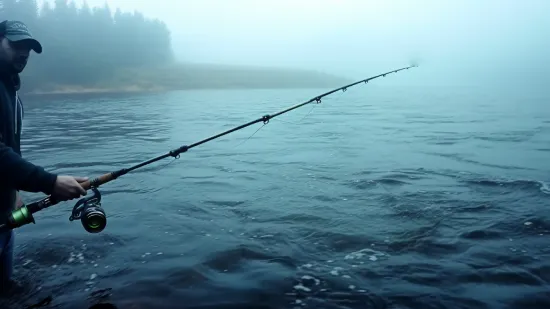
There are several key points to consider if you use a saltwater rod in freshwater. The following are listed:
1. Reel Type
When using a saltwater rod in freshwater, it’s important to consider the type of reel you use. Saltwater reels are specifically designed to withstand the harsh conditions of saltwater environments, such as corrosion and the extra strain put on the gear.
These reels are typically made with more durable materials and have stronger drag systems to handle larger and more powerful fish.
While you can technically use a saltwater rod with a freshwater reel, it may not provide the same level of performance and durability.
Using a saltwater reel ensures that your rod and reel combo is well-matched and capable of handling the demands of your fishing adventures in freshwater.
2. Line Size
The line size should be adjusted to suit the specific freshwater fishing conditions and target species.
In saltwater, the lines are thicker to withstand the harsh conditions and the abrasion caused by saltwater. However, in freshwater, the conditions are generally less harsh, so you can use thinner lines.
The size of your fishing line will depend on factors such as the size of the fish you’re targeting and the type of fishing you’re doing.
For example, if you’re fishing for small trout in a calm lake, you can use a lighter line. But if you’re targeting larger species like bass or pike, you may need a heavier line to handle their strength.
3. Lure/Bait Size
Using larger lures and baits in freshwater fishing can be highly effective for enticing bigger fish.
Saltwater lures and baits are designed to attract larger species, which means they are generally larger in size compared to their freshwater counterparts.
Using a saltwater rod in freshwater fishing can take advantage of the larger lures and baits to target larger fish species.
The increased size of the lures and baits allows for a more realistic presentation, increasing your chances of enticing a strike from the desired fish.
Differences Between Saltwater Rod and Freshwater Rod
A saltwater rod is different from a freshwater rod. Here are the differences between these two types of fishing rods:
1. Construction Materials
When selecting the right materials for your fishing rod, pay close attention to where you plan to cast your lines.
Saltwater rods require materials like titanium, carbon, or stainless steel for its guides and reel seats. These materials are highly resistant to corrosion and can better withstand exposure to saltwater and other harsh elements.
In stark contrast, freshwater rods can get away with lighter materials like aluminum oxide due to the relatively lower risk of corrosion in freshwater. Plus, lighter materials make handling easier, and you won’t have to worry about corrosion as much.
2. Size and Weight
In terms of size and weight, saltwater rods tend to be thicker and heavier than freshwater ones.
It’s because they need to handle larger and more aggressive saltwater species like marlin and sharks.
You can never be too prepared when you’re out in the open ocean. A heavier saltwater rod ensures that you’re not caught off guard when you hook a big fish.
On the other hand, freshwater rods are designed for ease of use and reduced weight. Especially if you’re going to be fishing for hours, you want a rod that won’t wear you out. Inshore and lighter models are perfect for those who want to enjoy a leisurely fishing trip.
3. Action
The action of your fishing rod is what makes all the difference in your fishing experience. Freshwater rods often have fast or extra-fast action, which allows for greater sensitivity and responsiveness. This is essential for freshwater fishing techniques, such as jigging, twitching, and cranking.
However, saltwater rods require a slower to medium action to handle the raw power of larger saltwater fish.
You won’t have the same level of sensitivity as you would with a freshwater rod, but you’ll have more strength and control to reel in that big catch. It’s all about balance and being able to adapt to your surroundings.
Can you use a freshwater reel with a saltwater rod?

Using a freshwater reel with a saltwater rod is possible, but it’s not the ideal choice for saltwater fishing. Saltwater fishing reels are designed with corrosion-resistant materials, such as anodized aluminum, to withstand the harsh saltwater environment.
While a freshwater reel might occasionally work in saltwater, it’s important to note that it’s not built to resist the corrosive effects of saltwater effectively.
Even with thorough rinsing and maintenance, the reel may never perform the same way again after exposure to saltwater.
It’s generally recommended to pair a saltwater reel with a saltwater rod when fishing in saltwater conditions to ensure optimal performance and durability.
Which fishing techniques are best suited to saltwater rods?
Saltwater fishing rods are designed to excel in a variety of fishing techniques, and their suitability depends on the specific category of the rod.
In general, saltwater rods can be categorized into spinning, bait-casting, trolling, and jigging rods. Spinning rods are versatile and commonly used for casting bait or lures. Bait-casting rods offer precision and control for more targeted casting.
Trolling rods are specially designed for towing bait or lure behind a moving boat, often in offshore settings. Jigging rods are robust and ideal for vertical jigging techniques.
Each type of saltwater rod is tailored to the demands of these fishing techniques, ensuring that anglers have the right tool for the job, whether inshore casting or offshore trolling.
Wrapping Up the Bait on Saltwater Rods in Freshwater Fishing
You now clearly understand why you can use a saltwater rod in freshwater and the key considerations to keep in mind.
The versatility, corrosion resistance, strength, and reel options of saltwater rods make them suitable for freshwater fishing adventures.
Just remember to choose the right reel, adjust your line size, and take advantage of the larger lures or baits when using a saltwater rod in freshwater.
While there are differences between saltwater and freshwater rods, the choice ultimately depends on your fishing goals and the type of fish you want to target.
So, whether you’re casting in the open sea or a tranquil freshwater lake, your saltwater rod can handle the challenge.


